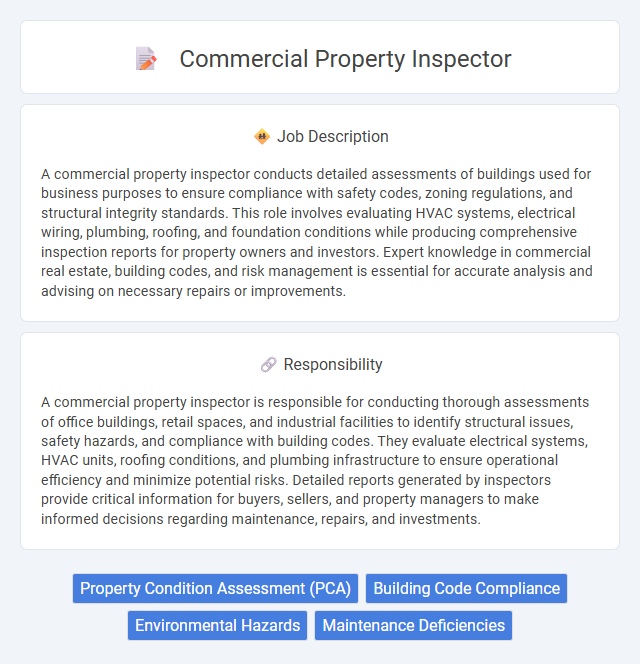
A commercial property inspector conducts detailed assessments of buildings used for business purposes to ensure compliance with safety codes, zoning regulations, and structural integrity standards. This role involves evaluating HVAC systems, electrical wiring, plumbing, roofing, and foundation conditions while producing comprehensive inspection reports for property owners and investors. Expert knowledge in commercial real estate, building codes, and risk management is essential for accurate analysis and advising on necessary repairs or improvements.
Individuals with strong attention to detail and a background in construction or engineering are likely to be well-suited for a commercial property inspector role. Those who can handle physical tasks and navigate various building environments may find the job compatible with their capabilities. People who prefer routine office work or have limited mobility might find the demands of this profession challenging.
Qualification
A commercial property inspector must possess specialized knowledge in building codes, construction methods, and safety regulations, often backed by certifications such as Certified Commercial Property Inspector (CCPI) or International Association of Certified Home Inspectors (InterNACHI) credentials. Strong analytical skills and experience in identifying structural issues, environmental hazards, and code violations are critical. Many employers prefer candidates with a background in engineering, architecture, or construction management to ensure thorough and accurate inspections.
Responsibility
A commercial property inspector is responsible for conducting thorough assessments of office buildings, retail spaces, and industrial facilities to identify structural issues, safety hazards, and compliance with building codes. They evaluate electrical systems, HVAC units, roofing conditions, and plumbing infrastructure to ensure operational efficiency and minimize potential risks. Detailed reports generated by inspectors provide critical information for buyers, sellers, and property managers to make informed decisions regarding maintenance, repairs, and investments.
Benefit
A commercial property inspector likely provides significant value by identifying potential structural issues and ensuring compliance with safety regulations, which may reduce costly repairs and legal risks for property owners. Their assessments could enhance informed decision-making during property transactions or management. This role probably offers benefits such as improved asset longevity and increased confidence in investment security.
Challenge
A commercial property inspector will likely face challenges such as identifying hidden structural issues and ensuring compliance with complex regulatory standards. The role probably demands a keen eye for detail and the ability to manage diverse property types under varying conditions. Successfully navigating these challenges might require continuous learning and adaptability to evolving industry practices.
Career Advancement
Commercial property inspectors play a crucial role in assessing building conditions, identifying safety hazards, and ensuring compliance with local regulations, making their expertise highly valued in the real estate and construction industries. Career advancement opportunities include progressing to senior inspector roles, project management positions, or transitioning into specialized fields such as environmental inspections or risk assessment consulting. Gaining certifications from recognized bodies like the International Association of Certified Home Inspectors (InterNACHI) can significantly enhance professional credibility and open doors to higher-paying roles and leadership positions.
Key Terms
Property Condition Assessment (PCA)
A Commercial Property Inspector specializing in Property Condition Assessment (PCA) conducts detailed evaluations of commercial buildings to identify structural, mechanical, and environmental issues. They prepare comprehensive reports that inform investors, lenders, and property managers about current conditions and potential risks, supporting informed decision-making for acquisition, financing, or maintenance planning. Expertise in building systems, regulatory compliance, and industry standards ensures accurate assessments that protect asset value and reduce liability.
Building Code Compliance
A commercial property inspector specializes in evaluating buildings to ensure strict adherence to local and national building codes, including fire safety standards, structural integrity, and accessibility regulations. They conduct thorough assessments of electrical, plumbing, and HVAC systems to identify code violations that could pose safety risks or legal issues for property owners. Their detailed reports support compliance efforts, facilitate property transactions, and help avoid costly fines or renovations.
Environmental Hazards
Commercial property inspectors specialize in identifying environmental hazards such as asbestos, mold, lead-based paint, and underground storage tanks that can affect the safety and value of a building. They utilize advanced testing methods and regulatory guidelines to assess contamination risks and ensure compliance with health and environmental standards. Their detailed reports support property owners and investors in making informed decisions about remediation and liability management.
Maintenance Deficiencies
Commercial property inspectors identify and document maintenance deficiencies such as HVAC system faults, roofing damage, electrical wiring issues, and plumbing leaks to ensure safety and compliance with building codes. These inspections help property owners prioritize repairs, reduce operational costs, and extend the lifespan of commercial assets. Detailed reports facilitate informed decision-making for maintenance budgets and risk management strategies.
 kuljobs.com
kuljobs.com